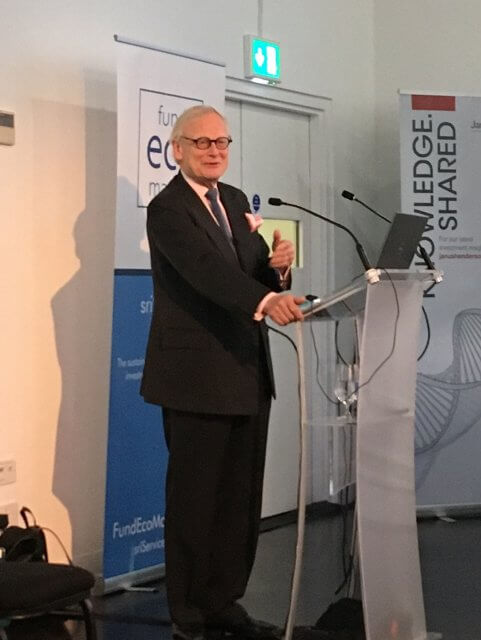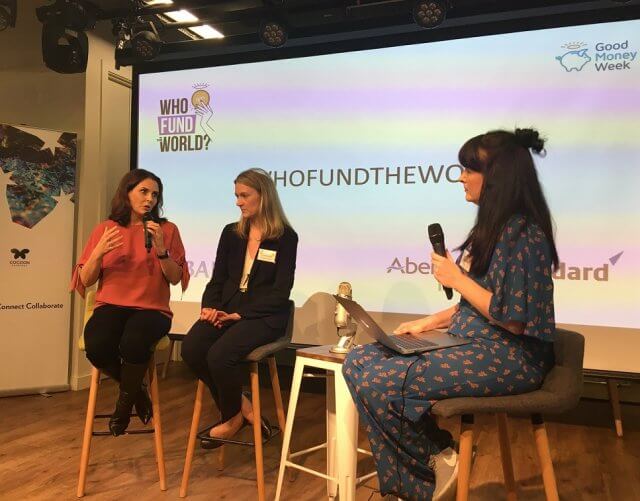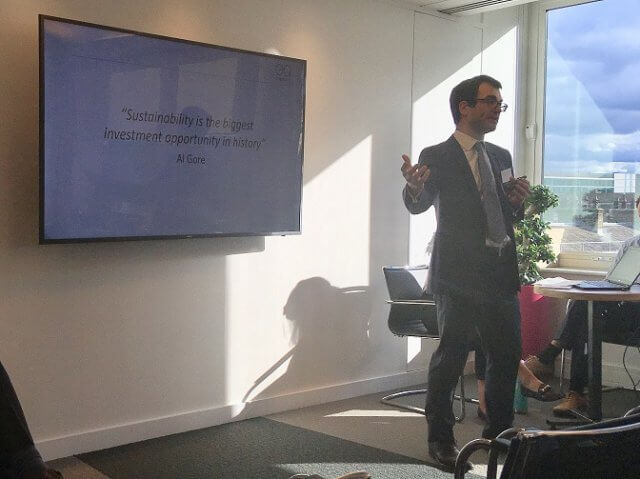Missed Good Money Week goings-on? Don’t worry, we’ve summarised them below…
4 October
Triodos Bank hosts the event: Impact Investing – Shaping the Future of Finance or Passing Trend?
Bevis Watts MD of @triodosuk introduces the #ImpactInvesting event at their stunning #bristol HQ with the explanation "there is no such thing as neutral #money" #goodmoneyweek #gmw18 #FPS pic.twitter.com/B0HZRGc96P
— Invest Bristol & Bath (@investbrisbath) October 4, 2018
A #GoodMoneyWeek listen from KKS Advisors…
Our podcast on Investing for Good is out! Hear some practical tips from Whitni Thomas @triodosuk, Bruce Davis @AbundanceInv, Lauren Peacock @ShareActionUK & Seb Beloe @WHEBsustainable! And @SeanDaveyUCL & myself chairing. #GoodMoneyWeek Listen here: https://t.co/Ecp6ztYevc pic.twitter.com/iKkug4It55
— Sophie Lawrence (@Sophie_KKS) October 4, 2018
3 October
Palm oil addressed best by investor engagement
Investment funds are best off engaging to improve practices of palm oil companies rather than divesting, says the Zoological Society of London (ZSL).
Speaking at the SRI Services’ Screened, Themed, Engaged event for Good Money Week, ZSL said withdrawing all investment from problem palm oil companies, some of which are guilty of deforestation on a huge scale, could make the situation worse.
Eleanor Spencer, ZSL’s SPOTT Engagement and Impact Coordinator said:
“We generally advocate for engagement over divestment, in the case of palm oil particularly. It is the most high-yielding of oil crops so if you were to substitute the palm oil crop with another oil crop it could lead to greater deforestation overall.
“Engagement allows you to push companies to improve practices and policies and ultimately bring the whole industry up to a higher standard.”
Spencer gave the example of IOI Group which came under pressure to clean up exploitation in its supply chain and environment-damaging practices in Malaysia and Indonesia:
“Following huge pressure from business IOI massively improved its policies. It promised to restore the land it lost and regain certification from the Roundtable for Sustainable Palm Oil.”
SPOTT is a ZSL initiative which provides the finance sector with transparency data on traders and producers of commodities including, palm oil, wood pulp and timber.
Download the first EVER Good With Money podcast here – it’s everything you need to know about sustainable investing to get started in 22 minutes ?
Investment expert says financial advisers will soon be forced to ask clients about values
Financial advisers will soon be obliged to ask new clients about their values, a sustainable investment conference in London was told.
Simon Howard, chief executive of UK Sustainable Investment and Finance Association(UKSIF), told the Screened, Themed and Engaged conference it is a matter of time before it becomes a requirement to make sure money is invested in line with client values:
“Two government reports in the past 12 months have said advisers should be made to ask their clients about their values as part of the onboarding process. The Growing a Culture of Social Impact Investing in the UK report was one of them the other was the Accelerating green finance: Green Finance Taskforce report.
“I have no doubt this is coming,” he said.
Home builders in line to be at heart of UK’s climate change battle

Construction is one of the UK’s biggest climate change culprits and will soon be feeling the pressure to change its ways, according to Lord Deben (pictured), a member of the Committee on Climate Change.
Deben was talking to the Screened, Themed and Engaged conference, part of Good Money Week, and said transport is also an issue but we are further along with addressing emissions from that sector:
“There is an obvious solution to transport as far as emissions are concerned. Electric vehicles will make a huge difference.”
He warned electric vehicles alone will not solve air quality problems however, because particulate matter from breaks and tyres are also problematic.
In terms of sectors playing their part to help the UK meet its targets to reduce greenhouse gas emissions, construction has not yet come under as much pressure:
“[Major constructors] are going to find themselves under increasing pressure- their business is going to be at the heart of what needs to be changed in order for us to meet our targets.
“If you just take the house building part… some are better than others but the nine major house builders who are building something like 80% of homes, they are not building to a level they ought to be building to, which they could do.”
Deben said more environmentally-friendly house materials will fall in price as demand goes up. He said home builders can make up for spending more on builds by buying land cheaper because its price is partly based on how much the building process will cost.
2 October
If you want to go ethical, don’t settle for anything else

“Don’t take no for an answer” when it comes to your ethical investment preferences women were told at a UK Sustainable Investment and Finance Association (UKSIF) event.
The event called Who Fund The World? was part of Good Money Week and gave women tips to get invested.
UKSIF campaign director, Charlene Cranny (pictured, far right), told attendees many financial advisers will still inform clients who don’t want any investments in fossil fuels that this is a bad idea, they will say they won’t help with it because it will damage returns. Cranny said:
“Don’t take no for an answer, you can ask for those things and you can have them. It is not necessarily true it will underperform.
“Educate yourself first before seeing an adviser. You can reflect your values in your investments.”
Access UKSIF’s guide to investing here.
People’s day-to-day work being undermined by their investments: EQ Investors

Many people do not realise their efforts to make the world a better place are being undermined by their investments, according to financial planning firm EQ Investors.
Speaking at a Good Money Week event in London, EQ Investors portfolio manager, Damien Lardoux (pictured), explained the disconnect:
“If [people] invest in passive products or do more traditional investing they will have a lot of exposure to companies or sectors which we would argue are having a negative impact.
“For example, of the FTSE100 index there is about 32 per cent of the index which is investing in tobacco companies, gambling companies, armaments companies etc.
“Investors might be teachers, nurses, doctors, they might volunteer with charities, they are doing a a lot of great work and do not know their investments are going against what they are trying to do on a daily basis.”
EQ Investors has recently launched an online calculator to show how much social and environmental impact your money would have in its Positive Impact Portfolio.
First-time investors more keen if it’s ethical
One third of non-investors would been keen to invest if they could do so ethically, according to online investment service, Wealthify.
Research by the company also found a quarter of people who are currently invested would pay a premium for an ethical portfolio.
In general, Wealthify found women were more likely to actively oppose investing in certain contentious companies, like those that use animal testing, than men. And young people, Wealthify says, are more keen to invest in ethical companies than older generations.
Looking at the motivations of ethical investors, the company found 58 per cent of women compared to 45 per cent of men would choose to invest ethically because it is “important to support companies that behave ethically and have a positive impact on society and the environment.” Two fifths of the group of women and men, 42 per cent, say it is their “responsibility to invest ethically and conscientiously”, and 28 per cent believe it would allow them to “secure their financial future and give something back at the same time.”
Wealthify recently launched its own ethical investment portfolios.
1 October
Women are untapped ethical investment gatekeepers: Aberdeen Standard
Women as household money managers are key to making investments work better for people and planet, according to Aberdeen Standard Investments.
The investment manager found 24 per cent of women compared to 20 per cent of men like the idea that their investment choices could make a positive difference in the world.
Aberdeen Standard says women were “enthusiastic about the difference they could make” in discussion groups.
Aberdeen Standard head of global ESG research, Amanda Young, said: “In particular women care about these matters and want to invest responsibly. As women are often the lead decision makers and money managers in household matters, they are uniquely positioned to help facilitate positive change and also influence the next generation to invest in ways which benefit society and the environment.”
Sustainability on the brain brings changes to investor behaviour
Consumers’ increasing focus on sustainability is driving the uptick in ethical investments, according to i News.
Where ethical investments as a total of invested assets have been stuck at around 1 per cent, the figure has finally crept up to 1.3 per cent.
Liontrust Asset Management head of sustainable investment, Peter Michaelis, says: “Sustainability is an increasingly important theme for consumers, who want what they wear, eat and drive to have a positive impact on the world around them. This is fundamentally changing businesses, from high street retailers to even commodity producers.”
30 September
Half of savers put same importance on provider values as returns
Nearly half of savers say they see the values of financial providers as having the same importance as the returns they get on their savings, according to research from Foresters Friendly Society.
The mutual’s survey of 2,000 adults also finds 27 per cent of parents looking for investment vehicles for their children would accept lower returns in order to invest with a provider that displays values to which they can relate.
Around one in five, 18 per cent, do not consider a provider’s social values and beliefs when choosing saving vehicles for their children.
A Good Money Week to start bridging the gender gap
Fidelity International is encouraging women to harness their financial power this Good Money Week, saying they could close the gender gap in pensions by increasing contributions by 1 per cent.
The company’s Financial Power of Women report finds 22 per cent of women invest in a stocks and shares ISA versus 29 per cent of men. Nearly half the number of women, 18 per cent, are invested in stock and shares not in an ISA or SIPP, with the figure at 33 per cent for men.
The gender pay gap is having a knock-on effect on women’s pensions, the report states. But this could be addressed, says Fidelity International investment director, Maike Currie:
“If women invested just an additional 1% of their salary into their workplace pension, we could close the gender pension gap. This means kick-starting engagement with investment overall – initiatives like Good Money Week give necessary exposure to a long-standing issue.”
JK Rowling awarded best female financial role model
Congratulations @jk_rowling ! You have been voted best female financial role model in our #GMW18 poll. Sadly, 20% of people can't name ANY good #female financial role model. Would you agree that this needs to change? https://t.co/OkdAcCNba2 #whofundtheworld #financialempowerment
— Good Money Week (@goodmoneyweek) September 29, 2018
29 September
Good With Money in The Times
The Times Money section looked at ethical investing and its appeal to millennials rather than their dyed-in-the-wool parents this Saturday, in honour of Good Money Week.
Planning firm feeling positive about impact of its investments
EQ Investors’ second annual impact report shows companies in its Positive Impact Portfolios are growing faster and having a more positive impact than those in the FTSE 100. The report coincides with the launch the EQ Investors Impact Calculator, which enables investors to measure what their money has been achieving. Fun fact: in the last year, £1 million invested in the Positive Impact Portfolios would have cleaned 3.5 million litres of waste water.
Calculating growth, the report states average revenue of companies in EQ Investors’ adventurous portfolio grew 60.4 per cent in the last year, 50 percentage points higher than in the FTSE 100. And to get an idea of overall impact, EQ investors looks at how many of the investments in its
Positive Impact Portfolios align to achieving the Sustainable Development Goals (SDGs) and found it beat the FTSE 100 on that front too. The adventurous portfolio includes 76.7 per cent of investments that align with the SDGs, more than double the 34 per cent of the FTSE 100 investments which are aligned with the goals.
Despite finding many ways to make investor money work for the planet, the financial planning firm highlights a lack of companies to invest in that would directly have a positive impact on some of the SDGs such as promoting gender equality, climate action, poverty alleviation and peace, justice and strong institutions.
Ethical fund assets treble in 10 years
Research from Hargreaves Lansdown (HL) shows despite the increasing retail sales of ethical funds, the £16.7 billion total still puts ethical at only 1.3 per cent of overall assets under management in the UK.
HL finds the performance of ethical UK equity funds is lower than their non-ethical equivalents when looking at a 10-year total return- 125.2% versus 134.4%. But it notes some small cap funds within the IA UK All Companies sector posted “exceptionally high returns over this period.”
Over 10 years ethical UK equity funds did perform better than both the FTSE All Share and the FTSE 4 Good UK Index by 18.6 and 18.8 percentage points respectively. Have a look at HL’s guide to ethical investing.
Liontrust makes some noise for sustainability innovators
For Good Money Week, Liontrust is giving a flavour of which companies it believes are doing “sustainable” well, including Irish food technology business, Kerry Group.
Liontrust says it likes Kerry Group’s commitment to reduce calories and remove artificial chemicals from foods, replacing them with natural alternatives. For example, Kerry Group has switched sugar for botanical extracts in its soft drinks.
Another sustainable investment winner in Liontrust’s eyes is Smurfit Kappa, a packaging company which uses 75 per cent recycled fibres in its packaging materials, sourcing the rest from its own plantations or third party suppliers.
Check out Liontrust’s list of sustainable investment themes and top innovators in each space.
Eiris estimates UK ethical assets nearing £20bn
Investment in UK green and ethical funds have reached just over £19 billion in 2018, according to Eiris Foundation. The charity looks at funds under management of UK-domiciled green or ethical retail funds.
It says the significant rise from 2017’s £16 billion shows a growing appetite for investments that take into account environmental and societal issues.
EIRIS Foundation chief executive, Peter Webster, finds the figures unsurprising considering reports from people working in the sector of how clients are increasingly interested in the ethical space.
Webster is keen to see the trend continue: “We look forward to even stronger growth in the future as we work with others to build a more sustainable economy,” he says.




